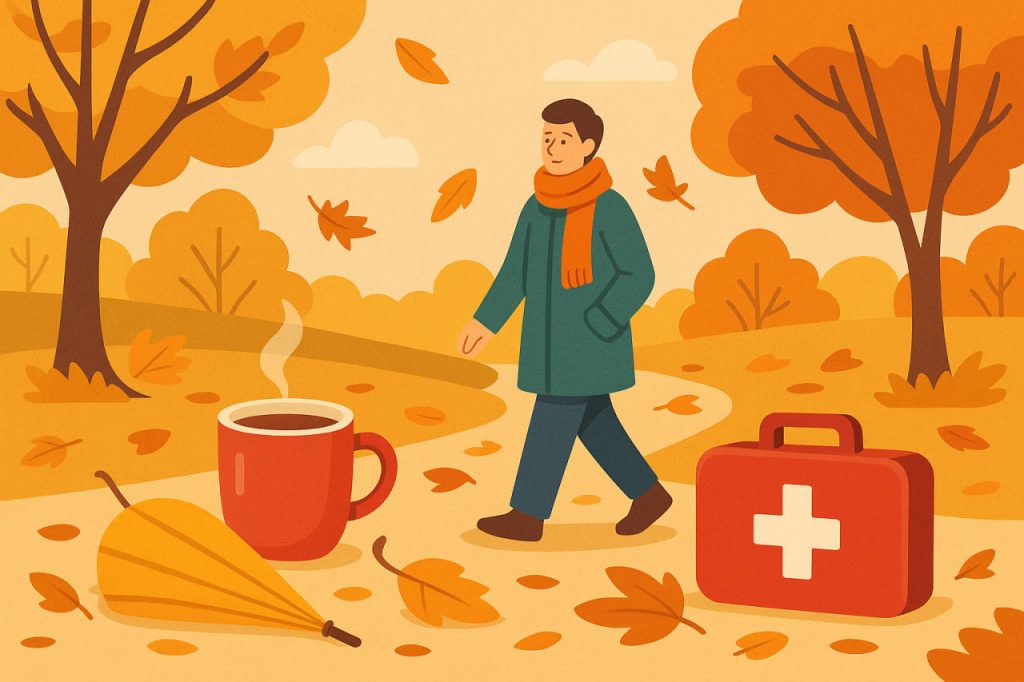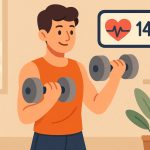Autumn is a beautiful and transitional time of year — the air becomes cooler, the days shorter, and nature prepares for winter. However, these changes also bring several health challenges that affect the immune system, mood, and overall well-being. Understanding the main risks of the autumn period and knowing how to protect yourself can help maintain energy and good health throughout the season.
Weakened Immunity and Seasonal Illnesses
As temperatures drop, the body becomes more vulnerable to viral infections, including the common cold, flu, and sore throat. The sudden shift from warm to cold weather stresses the immune system, while indoor heating dries out mucous membranes, making it easier for viruses to enter the body. Crowded public spaces, schools, and offices become hotspots for contagion.
To stay healthy, it’s important to:
- Dress appropriately in layers to avoid both chilling and overheating.
- Eat foods rich in vitamin C, zinc, and antioxidants to boost immunity.
- Wash hands frequently and ventilate rooms regularly.
- Stay hydrated — even in cool weather, the body loses moisture through breathing and heating systems.
Seasonal Depression and Fatigue
The reduction in daylight hours affects the brain’s production of serotonin and melatonin, hormones that regulate mood and sleep. This can lead to seasonal affective disorder (SAD) — a form of depression characterized by fatigue, low mood, and lack of motivation. People may feel more tired in the morning and experience cravings for sweets or carbohydrates.
Combating this begins with maintaining a consistent sleep schedule, spending time outdoors during daylight, and engaging in light physical activity such as walking or stretching. Warm-toned lighting and vitamin D supplementation can also help reduce symptoms of seasonal depression.
Exacerbation of Chronic Diseases
Autumn often triggers flare-ups of chronic conditions such as arthritis, asthma, cardiovascular disease, and gastrointestinal disorders. The body’s response to lower temperatures causes blood vessels to constrict, which can raise blood pressure and cause joint stiffness or pain. For sensitive individuals, damp and cold air may also irritate the respiratory system.
Regular check-ups, balanced diets, and staying physically active are crucial for managing these conditions. Wearing warm clothing and avoiding sudden temperature changes can help reduce discomfort.
Increased Risk of Injuries
Fallen leaves, rain, and early frosts create slippery surfaces, increasing the risk of slips and falls. Reduced daylight hours can also decrease visibility for drivers and pedestrians, leading to more road accidents. Comfortable shoes with non-slip soles and reflective clothing during evening walks help prevent these hazards.
Allergies and Air Quality
Many people assume allergies end with summer, but autumn introduces new triggers such as mold spores and dust mites that thrive in damp environments. Indoor heating systems can circulate these allergens, causing sneezing, coughing, or itchy eyes. Keeping living spaces clean, using air purifiers, and washing bedding in hot water can significantly improve air quality.
Immune and Mental Balance
Autumn is also a good time to focus on prevention and recovery. After the active summer months, slowing down allows the body to recharge. Practicing mindfulness, eating seasonal fruits like apples, pumpkins, and pears, and maintaining social connections help support both mental and physical resilience during this transitional period.
Interesting Facts
- The human immune system tends to be 20–30% weaker during sudden temperature changes.
- Pumpkin and carrots are rich in beta-carotene, which supports vision and immunity.
- People who spend at least 20 minutes outdoors daily experience fewer symptoms of autumn fatigue.
- Mold levels peak in September and October, especially after heavy rain.
Glossary
- Serotonin — a brain chemical that influences mood and happiness.
- Melatonin — a hormone that regulates sleep cycles, often disrupted by seasonal light changes.
- Seasonal affective disorder (SAD) — depression caused by reduced sunlight exposure.
- Antioxidants — natural compounds that protect cells from damage and support the immune system.
- Beta-carotene — a nutrient found in orange and yellow vegetables that strengthens the immune system and vision.


